冠词的用法
冠词的用法汇总
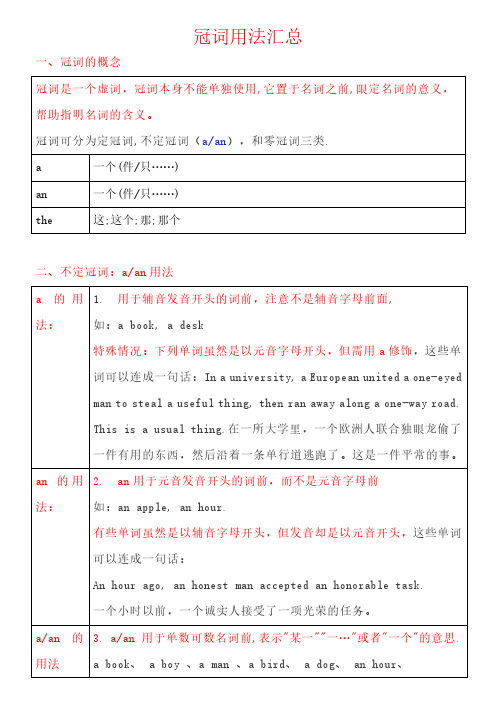
冠词用法汇总一、冠词的概念冠词是一个虚词,冠词本身不能单独使用,它置于名词之前,限定名词的意义,帮助指明名词的含义。
冠词可分为定冠词,不定冠词(a/an),和零冠词三类.a 一个(件/只……)an 一个(件/只……)the 这;这个;那;那个二、不定冠词:a/an用法a的用法:1.用于辅音发音开头的词前,注意不是辅音字母前面,如:a book, a desk特殊情况:下列单词虽然是以元音字母开头,但需用a修饰,这些单词可以连成一句话:In a university, a European united a one-eyed man to steal a useful thing, then ran away along a one-way road. This is a usual thing.在一所大学里,一个欧洲人联合独眼龙偷了一件有用的东西,然后沿着一条单行道逃跑了。
这是一件平常的事。
an的用法:2. an用于元音发音开头的词前,而不是元音字母前如:an apple, an hour.有些单词虽然是以辅音字母开头,但发音却是以元音开头,这些单词可以连成一句话:An hour ago, an honest man accepted an honorable task.一个小时以前,一个诚实人接受了一项光荣的任务。
a/an的用法3. a/an 用于单数可数名词前,表示"某一""一…"或者"一个"的意思.a book、 a boy 、a man 、a bird、 a dog、 an hour、an interesting book 、a big dog 、a dangerous animal4.表示类别:这种用法是指某人或某物属于某一种类,或者指某一种类的人或物中的任何一个或一件,或者指某一种类的人或物,但不具体说明是何人或何物。
意为one;例如:表示“一个”,意为one;指某人或某物。
冠词的用法总结

冠词的用法总结冠词是英语中常用的一类词汇,用于限定名词的范围和特定性。
准确使用冠词能够使句子更加准确简洁。
本文将总结冠词的用法,并提供一些例句来帮助读者理解。
一、定冠词(the)定冠词“the”用于特指特定的人、事物或概念。
具体用法如下:1. 特指已被提及过或双方都清楚的人或事物:- I saw a cat in the garden. The cat was black.(我在花园里看到了一只猫。
那只猫是黑色的。
)2. 特指独一无二的事物或类别:- The sun rises in the east.(太阳从东方升起。
)3. 特指某类人或事物中的个别成员:- The rose is a beautiful flower.(玫瑰是一种美丽的花。
)二、不定冠词(a/an)不定冠词“a”和“an”用于泛指某个人或事物,不具体特定。
具体用法如下:1. 泛指单数可数名词:- I saw a dog in the park.(我在公园里看到了一只狗。
)2. 泛指以辅音音素开头的单数可数名词时使用"a",泛指以元音音素开头的单数可数名词时使用"an":- He is an honest man.(他是个诚实的人。
)3. 表示数量、速度或比例:- A kilogram equals 1000 grams.(一千克等于一千克。
)三、零冠词有一些情况下,名词前不需要使用冠词,称为零冠词(zero article)。
具体用法如下:1. 泛指抽象名词、物质名词和复数名词:- Love is a wonderful feeling.(爱是一种美好的感觉。
)2. 用于专有名词、国家、语言、球类运动等:- I am learning Chinese.(我正在学汉语。
)- They play basketball every Saturday.(他们每个星期六打篮球。
)四、特殊用法除了常见的定冠词和不定冠词,还有一些特殊的冠词用法需要注意:1. 序数词和形容词最高级前常用定冠词:- He is the first person to arrive.(他是第一个到达的人。
冠词的用法
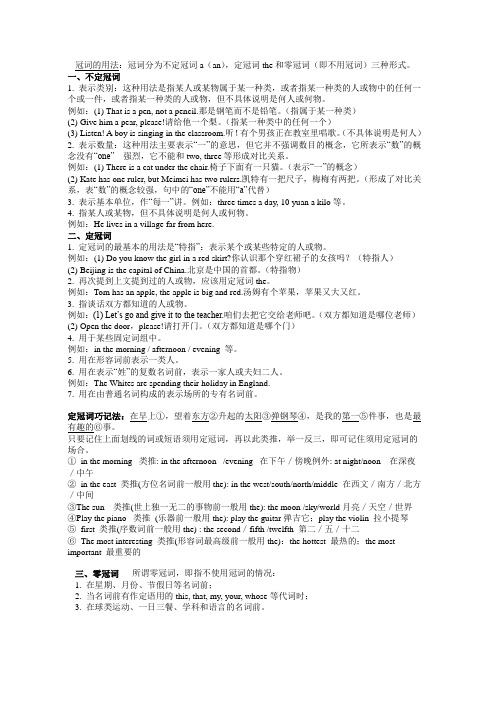
冠词的用法:冠词分为不定冠词a(an),定冠词the和零冠词(即不用冠词)三种形式。
一、不定冠词1. 表示类别:这种用法是指某人或某物属于某一种类,或者指某一种类的人或物中的任何一个或一件,或者指某一种类的人或物,但不具体说明是何人或何物。
例如:(1) That is a pen, not a pencil.那是钢笔而不是铅笔。
(指属于某一种类)(2) Give him a pear, please!请给他一个梨。
(指某一种类中的任何一个)(3) Listen! A boy is singing in the classroom.听!有个男孩正在教室里唱歌。
(不具体说明是何人)2. 表示数量:这种用法主要表示“一”的意思,但它并不强调数目的概念,它所表示“数”的概念没有“one”强烈,它不能和two, three等形成对比关系。
例如:(1) There is a cat under the chair.椅子下面有一只猫。
(表示“一”的概念)(2) Kate has one ruler, but Meimei has two rulers.凯特有一把尺子,梅梅有两把。
(形成了对比关系,表“数”的概念较强,句中的“one”不能用“a”代替)3. 表示基本单位,作“每一”讲。
例如:three times a day, 10 yuan a kilo等。
4. 指某人或某物,但不具体说明是何人或何物。
例如:He lives in a village far from here.二、定冠词1. 定冠词的最基本的用法是“特指”:表示某个或某些特定的人或物。
例如:(1) Do you know the girl in a red skirt?你认识那个穿红裙子的女孩吗?(特指人)(2) Beijing is the capital of China.北京是中国的首都。
(特指物)2. 再次提到上文提到过的人或物,应该用定冠词the。
冠词用法总结
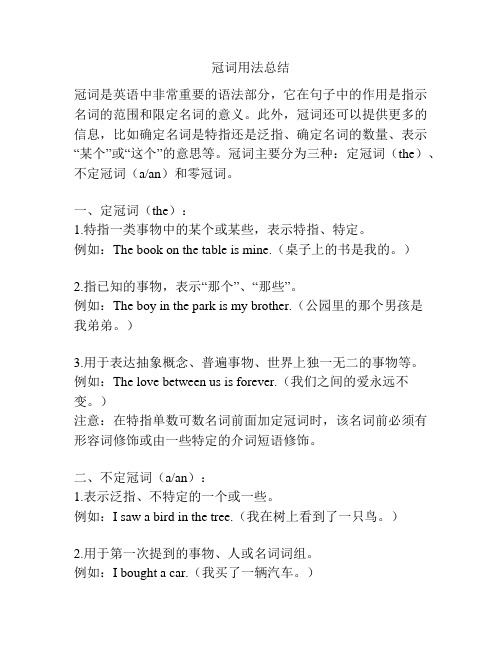
冠词用法总结冠词是英语中非常重要的语法部分,它在句子中的作用是指示名词的范围和限定名词的意义。
此外,冠词还可以提供更多的信息,比如确定名词是特指还是泛指、确定名词的数量、表示“某个”或“这个”的意思等。
冠词主要分为三种:定冠词(the)、不定冠词(a/an)和零冠词。
一、定冠词(the):1.特指一类事物中的某个或某些,表示特指、特定。
例如:The book on the table is mine.(桌子上的书是我的。
)2.指已知的事物,表示“那个”、“那些”。
例如:The boy in the park is my brother.(公园里的那个男孩是我弟弟。
)3.用于表达抽象概念、普遍事物、世界上独一无二的事物等。
例如:The love between us is forever.(我们之间的爱永远不变。
)注意:在特指单数可数名词前面加定冠词时,该名词前必须有形容词修饰或由一些特定的介词短语修饰。
二、不定冠词(a/an):1.表示泛指、不特定的一个或一些。
例如:I saw a bird in the tree.(我在树上看到了一只鸟。
)2.用于第一次提到的事物、人或名词词组。
例如:I bought a car.(我买了一辆汽车。
)3.在表示职业或身份的名词前,用a表示“一个”,表达所从事的职业或身份。
例如:He is an engineer.(他是一名工程师。
)4.在一些固定搭配中,表示“某个”。
例如:I will come back in a week.(我将在一个星期后回来。
)5.在以辅音音素开头的音节前使用a,以元音音素音节开头的音节前使用an。
例如:a book(一本书)、an apple(一个苹果)。
三、零冠词:1.表示泛指、不特定、抽象概念、普遍事物等。
例如:Dogs are loyal pets.(狗是忠诚的宠物。
)2.在复数名词前表示泛指。
例如:I like dogs.(我喜欢狗。
冠词的用法总结大全

冠词的用法总结大全1.定冠词- "the" 是英语中唯一的定冠词,用来指明具体的、特定的事物或人。
例如:The dog is barking.(这只狗在叫。
)2.不定冠词- "a" 和 "an" 是英语中的两个不定冠词,用来表示泛指、不具体的事物或人。
其中,"a" 用在以辅音音素开头的单数词前,"an" 用在以元音音素开头的单数词前。
例如:I bought a book.(我买了一本书。
)3.零冠词- 零冠词(zero article)是指名词前没有任何冠词的情况。
在以下情况下使用零冠词:- 一般事实或真理:Water is necessary for life.(水对生命来说是必需品。
)- 专有名词:I live in London.(我住在伦敦。
)- 天文学名词:The sun rises in the east.(太阳从东方升起。
)- 语言、学科、球类运动:She studies French.(她学习法语。
)- 跨国家国界的地名:She lives in New York.(她住在纽约。
)4.否定冠词- "no" 和 "not any" 通常被认为是否定冠词,用来表示否定或缺乏。
例如:I have no money.(我没有钱。
)5.不需冠词的情况-以下情况下一般不使用冠词:- 泛指的复数名词:Cats are cute.(猫很可爱。
)- 不可数名词表示泛指、抽象概念或具体的群体:Time flies.(光阴似箭。
)- 名词前有物主代词、指示代词、疑问代词或关系代词修饰:My dog is barking.(我的狗在叫。
)。
冠词的用法及搭配
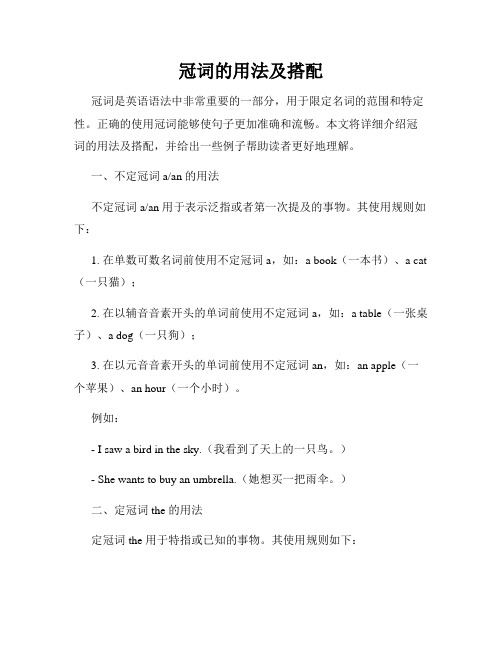
冠词的用法及搭配冠词是英语语法中非常重要的一部分,用于限定名词的范围和特定性。
正确的使用冠词能够使句子更加准确和流畅。
本文将详细介绍冠词的用法及搭配,并给出一些例子帮助读者更好地理解。
一、不定冠词 a/an 的用法不定冠词 a/an 用于表示泛指或者第一次提及的事物。
其使用规则如下:1. 在单数可数名词前使用不定冠词 a,如:a book(一本书)、a cat (一只猫);2. 在以辅音音素开头的单词前使用不定冠词 a,如:a table(一张桌子)、a dog(一只狗);3. 在以元音音素开头的单词前使用不定冠词 an,如:an apple(一个苹果)、an hour(一个小时)。
例如:- I saw a bird in the sky.(我看到了天上的一只鸟。
)- She wants to buy an umbrella.(她想买一把雨伞。
)二、定冠词 the 的用法定冠词 the 用于特指或已知的事物。
其使用规则如下:1. 在上文已经提到的名词前使用定冠词 the,如:the book(那本书)、the cat(那只猫);2. 在单数或复数名词前,表示一类特定的事物,使用定冠词 the,如:the sun(太阳)、the mountains(山脉);3. 在泛指某类事物时,使用定冠词 the,如:the sky is blue(天空是蓝色的)。
例如:- The cat is sitting on the table.(那只猫坐在桌子上。
)- I love the music.(我喜爱音乐。
)三、零冠词的用法有些情况下,名词前不需要使用任何冠词,这被称为零冠词。
其使用规则如下:1. 在一些具体的场合,如餐厅、学校、医院等,名词前不需要使用任何冠词,如:I am at school(我在学校);2. 泛指大自然中的事物,如天空、太阳、月亮等,名词前不需要使用任何冠词,如:The sky is clear(天空很晴朗);3. 在表示饮食、语言、学科、运动等抽象概念时,名词前不需要使用任何冠词,如:I study English(我学习英语)。
冠词用法总结
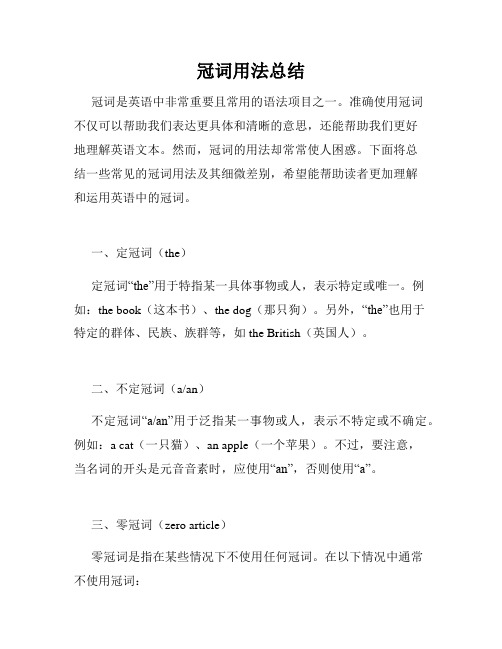
冠词用法总结冠词是英语中非常重要且常用的语法项目之一。
准确使用冠词不仅可以帮助我们表达更具体和清晰的意思,还能帮助我们更好地理解英语文本。
然而,冠词的用法却常常使人困惑。
下面将总结一些常见的冠词用法及其细微差别,希望能帮助读者更加理解和运用英语中的冠词。
一、定冠词(the)定冠词“the”用于特指某一具体事物或人,表示特定或唯一。
例如:the book(这本书)、the dog(那只狗)。
另外,“the”也用于特定的群体、民族、族群等,如the British(英国人)。
二、不定冠词(a/an)不定冠词“a/an”用于泛指某一事物或人,表示不特定或不确定。
例如:a cat(一只猫)、an apple(一个苹果)。
不过,要注意,当名词的开头是元音音素时,应使用“an”,否则使用“a”。
三、零冠词(zero article)零冠词是指在某些情况下不使用任何冠词。
在以下情况中通常不使用冠词:1.泛指名词复数:Birds can fly.(鸟可以飞翔。
)2.泛指的抽象名词:Love is blind.(爱情是盲目的。
)3.独特名词:London is the capital of England.(伦敦是英格兰的首都。
)四、特殊用法除了以上常见用法外,冠词还有一些特殊用法需要我们关注。
1. 用于序数词和形容词最高级前:He won the first prize.(他赢得了第一名。
)2. 用于乐器前,表示弹奏乐器:She plays the piano.(她弹钢琴。
)3. 用于姓氏复数前,表示整个家族:The Smiths are coming.(史密斯一家要来了。
)4. 用于特定名词前,表示类别:I love the cinema.(我喜欢电影院。
)5. 用于某些短语中:in the morning(在早上)、on the way(在路上)等。
五、错误用法常见问题虽然冠词的用法看起来简单,但是有时候却容易出错。
冠词的用法总结范文
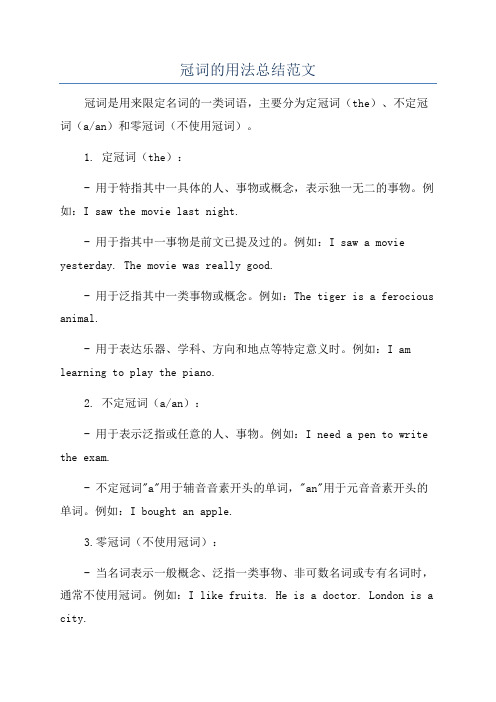
冠词的用法总结范文冠词是用来限定名词的一类词语,主要分为定冠词(the)、不定冠词(a/an)和零冠词(不使用冠词)。
1. 定冠词(the):- 用于特指其中一具体的人、事物或概念,表示独一无二的事物。
例如:I saw the movie last night.- 用于指其中一事物是前文已提及过的。
例如:I saw a movie yesterday. The movie was really good.- 用于泛指其中一类事物或概念。
例如:The tiger is a ferocious animal.- 用于表达乐器、学科、方向和地点等特定意义时。
例如:I am learning to play the piano.2. 不定冠词(a/an):- 用于表示泛指或任意的人、事物。
例如:I need a pen to write the exam.- 不定冠词"a"用于辅音音素开头的单词,"an"用于元音音素开头的单词。
例如:I bought an apple.3.零冠词(不使用冠词):- 当名词表示一般概念、泛指一类事物、非可数名词或专有名词时,通常不使用冠词。
例如:I like fruits. He is a doctor. London is a city.除了上述的用法外,冠词还有一些特殊用法,如:- 在表示乐器、学科、方向和地点等特定意义时使用定冠词(the)。
- 在表示序数词或最高级形容词时使用定冠词(the)。
- 在表示国家、地区、河流、山脉和海洋时使用定冠词(the)。
-在表示固定短语或习语中使用固定的冠词形式。
需要注意的是,冠词的使用在不同语言和不同语境中可能存在差异,需要根据具体语言的规则和语境来确定使用哪种冠词。
此外,冠词的正确使用也需要根据名词的单复数、可数性和语法功能等因素进行判断。
所以,学习和掌握冠词的用法需要通过大量的阅读和实践来提高。
- 1、下载文档前请自行甄别文档内容的完整性,平台不提供额外的编辑、内容补充、找答案等附加服务。
- 2、"仅部分预览"的文档,不可在线预览部分如存在完整性等问题,可反馈申请退款(可完整预览的文档不适用该条件!)。
- 3、如文档侵犯您的权益,请联系客服反馈,我们会尽快为您处理(人工客服工作时间:9:00-18:30)。
1. ---You mean you know the man? ---I know________ man exactly like him.A. otherB. theC. /D. a2. Wouldn't it be_________ wonderful world if all nations live in ________peace with one another?A. a, /B. the, /C. a, theD. the, the3. ---I hear that as many as 1,500 people were killed in the earthquake.---Yes, ________ news came as ________ shock to us.A. a, aB. the, aC. /, /D. /, a4. At midnight they reached ________ small village ________ east of ______ Everwhite Mountain.A. a,/, theB. a,/, /C. the, the, theD. the, an, an5. Nanjing lies on ________ Changjiang River and has ________ population of more than four million.A. the, theB. the, /C. the, aD. /, a6. Bill Clinton took ________ office on January 20th, 1993 and left ________ office on January 20th, 2001.A. /, /B. his, hisC. the, theD. an, his7. We learn to go all out to work for ____ good of ____ society.A. the, /B. /, /C. /, aD. the, the8. Paris is ____ most beautiful city, where you can see ____ famous Eiffel Tower.A. a, theB. a, /C. the, aD. the, the9. ---What about ____ bike? ---Do you think it all right to buy him ____ bike as ____ birthday present?A. the, the, theB. a, the, aC. the, a, theD. the, the, a10. He had decided to give it up, but on ____ second thoughts he decided to try ____ third time.A. the, aB. /, /C. a, aD. /, a11. Towards ____ morning, ____ heavy rain began to fall.A. the, aB. a, aC. the, /D. the, /12. ---Excuse me, where are ____ books for biology?---Follow me. They' re on this shelf. Do you want ____ new or used book?A. a, aB. a, theC. the, aD. the, the13. Young as he is, David has gained ____ rich experience in ____ society.A. /, /B. the, theC. a, /D./, the14. ---My son is lost. Did you see a boy passing by?---I saw ____ boy hidden behind ____ tree over there. You may go and have a look.A. a, aB. the, theC. a, theD. the, a15. Mary climbed to the top of the mountain in ____ hurry, looked down and found in ____ surprise that ____ whole town took on a new look.A. a, the, theB. a,/,theC. /,/,theD. /,/,a16. In ____ old society many young women died by so curious and cruel ____ custom.A. an, aB. /, theC. the, aD. the, /17. ---You' re sure to help me find ____ bed for my new house?---Sure, but not now. I'm heading for ____ bed and a good sleep.A. a, aB. the, aC. a, /D. the, /18. The wheel is thought to be _____ first invention of _____ transportation.A. the, theB. a, aC. a, /D. the, /19. Some people say that ____ British are _____ funny people.A. the, aB. /, theC. /, /D. the, /20. Don' t worry about _____ mistakes. They' re _____ natural part of learning.A. /, aB. the, /C. /, theD. the, the21. ---Selma looks especially pretty tonight. ---Yes, she always looks her best in _____ of that kind.A. the dressB. a dressC. dressD. the dresses22. --- _____did you think of the exhibition? ---Oh, it was ____ success.A. How, really aB. What, greatC. How, /D. What, quite a23. The child had only _____ slight temperature, but the doctor regarded _____ illness as serious enough for ____ hospital treatment.A. /,/,theB. a,/,/C. a, the,/D. /,the, the24. ---Did you have ____ wonderful time yesterday? ---Yes. I was on _____ top of _____ world.A. /, the, aB. a, /, theC. a, a, theD. a, the, the25. I don' t usually have _____ breakfast, but I always eat _____ good lunch.A. /, /B. /, aC. the, /D. /, the26. ---I hear there'll be ____ talk on English study tomorrow morning.---Do you mean ____ speech our teacher asked us to listen to?A. a, theB. the, aC. the, theD. a, a27. Mr. Stock runs _____ small business, who is in ____ Mexico on business.A. a, aB. /, /C. a, theD. a, /28. Although _____ motor car has been with us for almost a century, I have never been able to drive_____ American one.A. a, theB. a, /C. the, anD. the, the29. Xi'an was _____ starting point of _____ world-famous Silk Road.A. /, /B. a, aC. the, /D. the, the30. ---What does "on _____one hand…on _____other" means?---What_____great fun! You're asking me such a simple question.A. the, the, /B. the, the, aC. /, the, aD. /, the, /1. In America, ____ car is ____ popular means of transportation.A. the, theB. a, theC. the, /D. the, a2. ---- What happened? ---- They left in such ____ hurry that they forgot to lock ____ door.A. a, aB. a, theC. /, theD. /, a3. There were two small rooms in the house, ____ smaller of which served as ____ kitchen.A. a, theB. the, aC. the, theD. a, a4. I ordered ____ book some time ago. ____ book has arrived.A. a, TheB. the, AC. a, AD. /, The5. Mr Smith is ____ European and his wife is ____ American.A. an, anB. a, aC. a, anD. an, a6. Lesson 10 is ____ most difficult lesson, but it isn’t ____ most difficult lesson in Book One.A. a, aB. a, theC. the, theD. the, a7. My sister works in a factory. She goes home once ____ month. A. a B. an C. the D. every8. He was absent because he had caught ____.A. heavy a coldB. the heavy coldC. a heavy coldD. heavy cold9. ____ water is ____ liquid. A. The, a B. A, a C. /, / D. /, a10. In winter ____ people often hang up wet clothes near ____ fire.A. /, /B. a, aC. /, aD. the, a11. He has tried twice, and the captain asks him to have ____ third try.A. aB. theC. anotherD. other12. He was a top student in the class, he often got ____ in English.A. firstB. a firstC. secondD. the second13. ____ horse is ____ useful animal. A. The, the B. The, a C. The, an D. /, a14. Tom left Shanghai in ____.A. the summer 1995B. summer 1995C. 1995 the summerD. the summer of 199515. ____ children here live ____ most happy life. A. The, the B. The, a C. The, / D. /, the16. The soldier died during ____ World War I. A. the B. the first C. / D. a17. In ____ Marx began to learn Russian.A. a 1870B. 1870sC. the year of 1870D. the 1870s18. Alice is ____ of the two girls. A. taller B. the tall C. more tall D. the taller19. ---- Can your sister play ____? ---- No, but she can play ____.A. the tennis, the pianoB. tennis, pianoC. the tennis, pianoD. tennis, the piano20. The introduction is always in ____ of a book.A. frontB. the frontC. a frontD. instead21. She touched her daughter gently ____ shoulder.A. in herB. on herC. in theD. on the22. Both ____ wounded and ____ sick were sent to safety.A. /, /B. the, theC. /, theD. the, /23. ____ doctors and ____ nurses should care for their patients.A. The, theB. /, /C. The, /D. /, the24. Tell us the story as ____ Mother told you. A. a B. the C. an D. /25. Do you know how long ____ has lived on the earth?A. manB. the manC. a manD. men26. The man was once thrown into ____ prison for robbing the bank. A. a B. an C. theD./27. ____ Mount Tai is in the east of China. A. A B. The C. / D. That28. I like ____ history. I am studying ____ history of China.A. the, /B. /, theC. a, /D. /, a29. He wrote a letter ____ pencil. A. with B. in C. in a D. use a30. On October 1, the Chinese people celebrated ____ with new achievements and victories.A. National DayB. the National DayC. our National DayD. a National Day。
